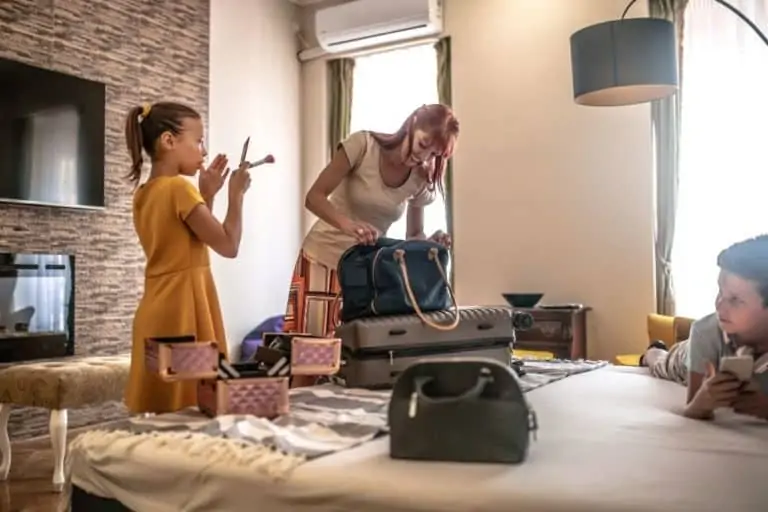How To Prevent Your Baby From Getting Motion Sickness On The Bus
Are you one of those moms who dread car trips because you can never seem to escape nausea and vomiting? You’re not alone. Many mommies struggle with motion sickness when traveling with their children. But don’t worry! Some tips can help make your trip more bearable. Keep reading for our top tips on surviving motion sickness with your child!
Why does motion sickness happen so often in children?
There are a few different reasons that children are more prone to motion sickness than adults:
- Their inner ear is still developing, making them more sensitive to movement.
- Kids tend to focus on things much closer to them than adults do, so they may become dizzy if they try to look out the window for long periods.
- Kids get excited when they’re on the move, making their breathing and heart rate speed up, and making them feel more nauseous.
So how can you prevent or lessen the effects of travel sickness in your child?
There are a few things you can do to help reduce the chances of your child getting travel sick.
How can I prevent motion sickness in my child?
What are some tips to prevent motion sickness in children? First, have them eat a good breakfast or lunch before the ride – but make sure it’s light. A full stomach will help during the trip. Second, if they’re old enough, have them drink lots of fluids – especially ginger ale, which can help with nausea. Finally, try to keep them distracted and looking ahead during the ride by playing games or singing songs together.
What should I do if my child starts to feel sick?
First, ask the bus driver to stop the bus as soon as possible so they can get some fresh air. Additionally, have them drink small sips of water or clear soda to keep their stomach from getting too upset. Finally, apply a cool compress to their forehead or neck to help ease any nausea.
What are some other ways to make bus rides more bearable for kids?
In addition to the tips above, you can do a few other things to make bus rides more enjoyable for your child. First, try to avoid bumpy roads if possible – smooth sailing will help everyone feel better. Second, bring snacks and drinks for the ride so you can take breaks.
How do I sit my baby so they feel less motion sickness?
Try putting your youngster in a window seat so they may look outside and realize they’re going. If you can, sit in front of the bus. This will help your child see ahead and know what’s coming. It will also help them feel less motion sickness because they won’t feel like they’re being thrown around as much. Finally, you might want to hold them in your arms so they can feel your body’s movement and know they’re not alone.
What can I do to prevent my baby from getting motion sickness on the bus?
You can try to avoid sudden starts and stops, and you can try to make smooth easy curves. You can also try to keep the bus cool and well-ventilated, and you can try to keep your baby’s head up and facing forward.
Finally, offer your baby a pacifier or toy to keep them occupied during the journey.
Talk to your child about motion sickness before getting on the bus.
If you’re worried about your child getting motion sickness on the bus, you should talk to them about it before you even get on the bus. Explain what motion sickness is and how it can make people feel. Tell them that it’s nothing to be embarrassed about and that there are things they can do to help themselves feel better.
If you know your child is prone to motion sickness, it’s a good idea to bring snacks and drinks for them on the bus. This can help settle their stomach and prevent them from getting too hungry or thirsty.
No one likes getting sick, least of all children. If your child gets motion sickness, bring some paper towels or a wet washcloth for them. You might also want a change of clothes if they vomit on themselves.
Make sure your child takes plenty of breaks.
If your child is motion sick, make sure they take plenty of breaks. This will help them feel better and prevent them from getting too sick. You can have them sit out at a few stops to get some fresh air or let them walk around the bus for a few minutes.
If your child is struggling with motion sickness, you might need to consider getting off the bus at the next stop. This will give them time to recover and prevent them from getting too sick.
Keep a window open for fresh air.
Motion sickness is often worse when it’s hot and stuffy on the bus. If possible, keep a window open for fresh air. This will help your child feel better and might prevent them from getting sick in the first place.
Try some natural remedies.
You can try a few natural remedies to help your child with motion sickness. Ginger is a common one that can help settle the stomach. You can give your child ginger candies or tea or just have them smell it. Peppermint oil can also help with nausea. Put a few drops on a tissue and have your child smell it when feeling sick.
If all else fails, you can always try medication.
A few different types of medication can help with motion sickness. If your child is struggling, you might consider trying one of these. Be sure to talk to your doctor first to ensure it’s safe for your child.
Look straight ahead and avoid reading or looking at screens.
One of the worst things you can do when you’re feeling motion sickness is to read or look at screens. This will only make the problem worse. Instead, try to look straight ahead at a fixed point. This will help your child focus on something and prevent them from getting too sick.
Always bring a water bottle and napkins with you. You can wash and clean your baby’s face and hands to keep them clean.
Don’t forget to stay hydrated.
Motion sickness can often be made worse by dehydration. Ensure your child is drinking plenty of fluids, especially if they’re vomiting. This will help them feel better and prevent them from getting too dehydrated.
Avoid strong smells
Strong smells can often make motion sickness worse. If possible, try to avoid them. This might mean asking people not to wear perfume or cologne on the bus. It might also mean avoiding certain foods that have strong smells.
Talk to your child’s doctor if the problem persists.
If your child is still having a lot of trouble with motion sickness, you might want to talk to their doctor. They can help you figure out what’s causing the problem and how to best deal with it.
If your child starts to feel sick, ask your child to look out the window at stationary objects.
This will help them focus on something other than the feeling of sickness. It also might help them close their eyes and take some deep breaths. Motion sickness is often worse when you focus on it, so try to distract your child as best you can.
Pull over if necessary and let the kid vomit outside (or in a bag).
If your child is struggling, you might need to ask the bus driver to pull over and let them vomit outside. This will help them feel better and prevent them from getting too sick. Just be sure to have a bag handy if they need to vomit on the bus.
If your child does vomit on the bus, be sure to clean it up immediately. This will help prevent the spread of germs and keep everyone on the bus healthy.
Praise your kid for making it through without getting sick, and give them a treat!
After a long bus ride, praising your child for making it through without getting sick is important. This will help them feel better and hopefully prevent motion sickness. You might also want to give them a small treat as a reward for being brave.
Be patient with your child.
It’s essential to be patient with your child if they’re struggling with motion sickness. They might not be able to help it, which can be difficult for them to control. Just try to understand and help them through it as best you can.
Motion sickness can be a real bummer, but there are ways to prevent it. Following our tips for what to eat and drink during travel can help keep your child’s stomach calm and your journey smooth. And if all else fails, we’ve got some recipes for motion sickness that can be a real bummer, but thankfully there are ways to prevent it.
Bon, voyage!





